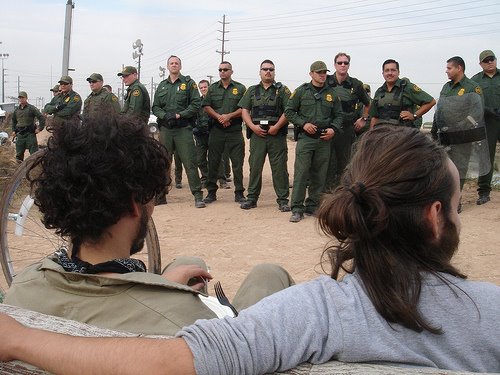Published: September 17, 2009
LOS ANGELES — Government auditors reported Thursday that the effort to secure the Mexican border with technology and fences has fallen years behind schedule, will cost billions of dollars extra in maintenance costs and has no clear means of gauging whether illegal crossings have been curtailed.
Mark Borkowski, who directs the Secure Border Initiative for the Department of Homeland Security, stood by the program as “transformational,” but did not challenge the findings. “We are as frustrated as anybody is” with the setbacks, Mr. Borkowski said in an interview.
The report, by the Government Accountability Office, Congress’s watchdog, said the department had fallen about seven years behind its goal of putting in place the technology the Bush administration had heavily promoted when it announced the Secure Border Initiative in 2005.
In 2006, the report said, the department estimated it would have a system of cameras, radars and sensors in place to aid a force of border guards by the end of 2009, but the completion date is now projected as 2016.
“Flaws found in testing and concerns about the impact of placing towers and access roads in environmentally sensitive locations caused delays,” said Richard M. Stana, an author of the report. The cameras and radars, a “virtual fence” in a system designed by the contractor, Boeing, have fallen prey to weather and mechanical problems.
The effort to build 661 miles of fences blocking vehicles or pedestrians is nearly complete, but with 28 miles left to go, it has been delayed by lawsuits from landowners in Texas.
The government has spent $2.4 billion on such “physical infrastructure,” but the report said it could cost $6.5 billion over 20 years to maintain it.
For all the money spent, the department has not set up a way to evaluate the fences’ impact, relying mainly on the judgment of senior Border Patrol agents.
Mr. Borkowski said the government auditors were overly “pessimistic,” and, while he offered no guarantees, he predicted the system would prove successful. He said the department was studying ways to judge its success beyond managers’ opinions.
The apprehension of illegal immigrants at the border has fallen to lows not seen in decades, but scholars and Mexican officials say the recession and the lack of jobs in the United States have contributed to the drop.
Representative Bennie Thompson, Democrat of Mississippi and the chairman of the House Homeland Security Committee, said in response to the report that department officials needed to get the Secure Border Initiative “right or find an alternative technology solution.”
Read article: http://www.nytimes.com/2009/09/18/us/18fence.html

No comments:
Post a Comment